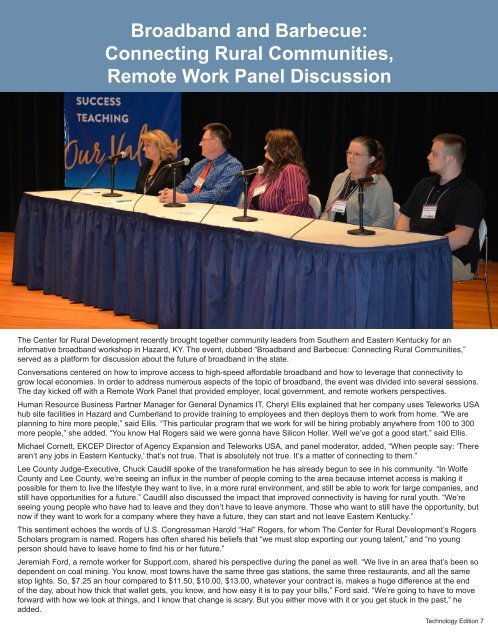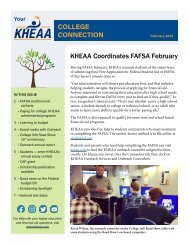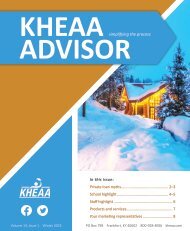2019 Technology FINAL
Create successful ePaper yourself
Turn your PDF publications into a flip-book with our unique Google optimized e-Paper software.
Broadband and Barbecue:<br />
Connecting Rural Communities,<br />
Remote Work Panel Discussion<br />
The Center for Rural Development recently brought together community leaders from Southern and Eastern Kentucky for an<br />
informative broadband workshop in Hazard, KY. The event, dubbed “Broadband and Barbecue: Connecting Rural Communities,”<br />
served as a platform for discussion about the future of broadband in the state.<br />
Conversations centered on how to improve access to high-speed affordable broadband and how to leverage that connectivity to<br />
grow local economies. In order to address numerous aspects of the topic of broadband, the event was divided into several sessions.<br />
The day kicked off with a Remote Work Panel that provided employer, local government, and remote workers perspectives.<br />
Human Resource Business Partner Manager for General Dynamics IT, Cheryl Ellis explained that her company uses Teleworks USA<br />
hub site facilities in Hazard and Cumberland to provide training to employees and then deploys them to work from home. “We are<br />
planning to hire more people,” said Ellis. “This particular program that we work for will be hiring probably anywhere from 100 to 300<br />
more people,” she added. “You know Hal Rogers said we were gonna have Silicon Holler. Well we’ve got a good start,” said Ellis.<br />
Michael Cornett, EKCEP Director of Agency Expansion and Teleworks USA, and panel moderator, added, “When people say: ‘There<br />
aren’t any jobs in Eastern Kentucky,’ that’s not true. That is absolutely not true. It’s a matter of connecting to them.”<br />
Lee County Judge-Executive, Chuck Caudill spoke of the transformation he has already begun to see in his community. “In Wolfe<br />
County and Lee County, we’re seeing an influx in the number of people coming to the area because internet access is making it<br />
possible for them to live the lifestyle they want to live, in a more rural environment, and still be able to work for large companies, and<br />
still have opportunities for a future.” Caudill also discussed the impact that improved connectivity is having for rural youth. “We’re<br />
seeing young people who have had to leave and they don’t have to leave anymore. Those who want to still have the opportunity, but<br />
now if they want to work for a company where they have a future, they can start and not leave Eastern Kentucky.”<br />
This sentiment echoes the words of U.S. Congressman Harold “Hal” Rogers, for whom The Center for Rural Development’s Rogers<br />
Scholars program is named. Rogers has often shared his beliefs that “we must stop exporting our young talent,” and “no young<br />
person should have to leave home to find his or her future.”<br />
Jeremiah Ford, a remote worker for Support.com, shared his perspective during the panel as well. “We live in an area that’s been so<br />
dependent on coal mining. You know, most towns have the same three gas stations, the same three restaurants, and all the same<br />
stop lights. So, $7.25 an hour compared to $11.50, $10.00, $13.00, whatever your contract is, makes a huge difference at the end<br />
of the day, about how thick that wallet gets, you know, and how easy it is to pay your bills,” Ford said. “We’re going to have to move<br />
forward with how we look at things, and I know that change is scary. But you either move with it or you get stuck in the past,” he<br />
added.<br />
<strong>Technology</strong> Edition 7


















